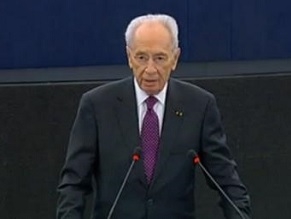|
World Jewish News

Israeli President Shimon Peres addressing the European Parliament in Strasbourg in March 2012.
|
The last of Israel's founding fathers, former Israeli President Shimon Peres dies at 93
28.09.2016, Israel The last of Israel's founding fathers, former Israeli President Shimon Peres and winner of the 1994 Nobel Peace Prize died Tuesday after suffering a stroke two weeks ago.
He was 93.
Doctors said Peres suffered severe organ failure Tuesday, as well as irreversible brain damage caused by the massive hemorrhagic stroke he sustained on September 13.
The longest serving of all of Israel’s public servants, Peres was a person about whom it could rightly be said: The history of the State of Israel is the history of Shimon Peres, writes The Jerusalem Post.
In a career spanning nearly 70 years, Peres was considered a servant of the state who was intimately involved in every aspect of Israel’s history since before the state founding.
A lifetime searching for peace with Israel’s Arab neighbors was rewarded on December 10, 1994, when Peres – along with then Prime Minister Yitzhak Rabin and PLO chairman Yasser Arafat – received a Nobel Peace Prize. The award recognized their work as the architects of the 1993 interim peace deal known as the Oslo Accords – a pact that to Peres’s dismay never hardened into a lasting treaty.
In his 48 years in parliament – from the fourth Knesset in 1959 through the 17th in 2007 – Peres served in various parliamentary groups, including Mapai, Rafi, Labor, the Alignment, Labor, One Israel, Labor-Meimad, Labor-Meimad-Am Ehad and Kadima. His main affiliation was serving as chairman of the Labor Party.
Peres’s string of government roles included two stints as Prime Minister – from 1984 to 1986 as part of a rotational government, and for seven months in 1995 and 1996 after the assassination of Yitzhak Rabin – as well as Minister of Immigrant Absorption, Transportation, Information, Defense, Communications (or posts and telegraphs as it was known at the time), Internal affairs, Religious affairs, Foreign Affairs, Finance, Regional cooperation, and Development of the Negev and Galilee, serving in some of those positions more than once. He also served several times as acting Prime Minister, Deputy Prime Minister and Vice Prime Minister.
Ironically, though Peres ran for office five times from 1977 and 1996, he never won a national election outright.
Peres was born August 2, 1923, in Wiszniewo, Poland, as Szymon Perski, and immigrated to Palestine with his family at the age of 11. He grew up in Tel Aviv, attending the Balfour and Geula schools in Tel Aviv, and the agricultural high school in Ben Shemen. He spent several years at Kibbutz Geva and Kibbutz Alumot, of which he was one of the founders. In 1943, was elected secretary of the Labor-Zionist youth movement.
At age 24, he worked with David Ben-Gurion and Levi Eshkol in command of the Hagana, responsible for manpower and arms. During and after the War of Independence, Peres served as head of the naval services.
In 1952, he joined the Defense Ministry and, a year later at the age of 29, was appointed its director-general – the youngest ever in Israel’s history – playing an important role in developing the Israeli military industry and promoting the development of Israel Aerospace Industries.
Peres was elected a member of Knesset in 1959, and served until his election as president in June 2007. Among his achievements as deputy defense minister from 1959 to 1965 were the establishment of the military and aviation industries, and the promotion of strategic ties with France, which culminated in strategic cooperation during the 1956 Sinai Campaign. Peres also was responsible for establishing Israel’s nuclear program.
For three years following the 1973 Yom Kippur War, Peres again played a central role in the country’s security as defense minister. In that role, he revitalized and strengthened the IDF and was involved in the disengagement negotiations that led to the 1975 Interim Agreement with Egypt. He also was instrumental in the planning of the 1976 Entebbe rescue operation.
Peres briefly served as acting prime minister following the resignation of Rabin in 1977, and later served his first tenure as prime minister in the national unity government from 1984 to 1986, based on a rotation arrangement with Likud leader Yitzhak Shamir.
From November 1988 until the dissolution of the National Unity Government in 1990, Peres served as finance minister, focusing his energies on the failing economy and the complex situation resulting from the 1982 war in Lebanon. He is credited with reducing the annual inflation rate from 400% to 16% and was instrumental in the withdrawal of troops from Lebanon and the establishment of a narrow security zone in southern Lebanon.
After the return to power of the Labor party in the 1992 elections, Peres was again appointed Foreign Minister and he initiated and conducted the negotiations that led to the signing of the Declaration of Principles with the PLO in September 1993.
Peres’s second term as prime minister came in the wake of the assassination of Rabin on November 4, 1995. The Labor Party chose Peres as Rabin’s successor, and the Knesset confirmed the decision with a vote of confidence supported by both coalition and opposition members.
Despite polls showing him far ahead, Peres lost to rightist Likud leader Benjamin Netanyahu in the election on May 29, 1996, by fewer than 30,000 votes.
In October, 1997, Shimon Peres created the Peres Center for Peace with the aim of advancing Arab-Israeli joint ventures. He was also the author of 12 books.
When he was sworn in as Israel’s ninth president on July 15, 2007, Peres was the first former prime minister to do so. He was two weeks shy of his 91st birthday when he completed his seven-year term in 2014.
Peres’s wife, Sonia, died in 2011. The couple had three children, eight grandchildren and numerous great-grandchildren.
EJP
|
|
